轻工技术与工程一级学科硕士研究生培养方案
工业工程专业硕士培养方案

工业工程专业硕士培养方案一、培养目标工业工程专业硕士培养方案的首要目标是培养具备高水平工业工程理论知识和实践能力的专门人才。
具体包括以下几个方面:1.掌握工业工程学科的基本理论和专业知识,包括工程系统分析、优化理论、工程管理等;2.培养具备工业工程实践能力和创新能力,能够独立进行工程项目的规划、设计、管理和实施;3.具备一定的跨学科交叉能力,能够理解和应用相关领域的知识,如管理学、心理学等;4.具备良好的科学素养和较强的团队合作精神,能够在跨学科、跨行业的工作环境中进行协调和合作。
二、专业课程设置工业工程专业硕士课程设置应该既注重理论教学,又要加强实践教学。
具体包括以下几个方面的课程设置:1.工业工程基础课程:包括工程系统分析、运筹学、设计与分析方法、管理工程等;2.专业核心课程:包括工程优化理论、供应链管理、生产系统工程、工程管理等;3.交叉学科课程:包括管理学、心理学、信息技术等相关领域的知识;4.实践教学:包括工程实习、毕业设计等实践环节,培养学生的工程实践能力。
三、实习实践工业工程专业硕士培养方案应该注重实践能力的培养,因此实习实践环节是非常重要的。
学校应该与企业合作,通过实习、毕业设计等形式,让学生接触实际工程项目,培养其工程实践能力。
同时,学校应该为学生提供一定的实践环境和资源,如实验室设备、企业合作资源等,让学生能够将学到的理论知识应用到实际工程项目中去。
四、论文要求工业工程专业硕士培养方案要求学生在学习期间完成一定的论文研究。
论文研究应该注重理论与实践相结合,既要有一定的理论深度,又要有一定的实际应用价值。
学校应该鼓励学生选择有一定实践意义的课题,引导学生深入实际工程项目进行研究,培养其学术研究能力和实践能力。
总之,工业工程专业硕士培养方案应该注重理论与实践的结合,既要注重学生的理论知识学习,又要注重培养学生的工程实践能力。
学校应该与企业合作,为学生提供实践环境和资源,让学生能够在学习过程中接触实际工程项目,培养其工程实践能力。
食工学院轻工技术与工程领域工程硕士培养方案-发酵工程方向(2012-4-9)
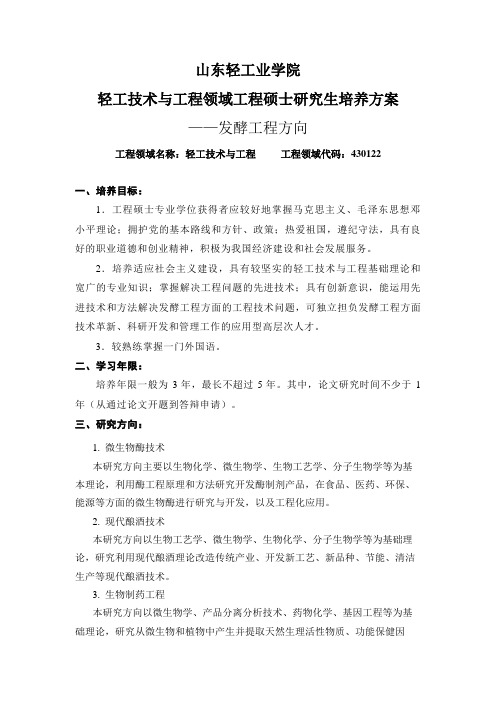
山东轻工业学院轻工技术与工程领域工程硕士研究生培养方案——发酵工程方向工程领域名称:轻工技术与工程工程领域代码:430122一、培养目标:1.工程硕士专业学位获得者应较好地掌握马克思主义、毛泽东思想邓小平理论;拥护党的基本路线和方针、政策;热爱祖国,遵纪守法,具有良好的职业道德和创业精神,积极为我国经济建设和社会发展服务。
2.培养适应社会主义建设,具有较坚实的轻工技术与工程基础理论和宽广的专业知识;掌握解决工程问题的先进技术;具有创新意识,能运用先进技术和方法解决发酵工程方面的工程技术问题,可独立担负发酵工程方面技术革新、科研开发和管理工作的应用型高层次人才。
3.较熟练掌握一门外国语。
二、学习年限:培养年限一般为3年,最长不超过5年。
其中,论文研究时间不少于1年(从通过论文开题到答辩申请)。
三、研究方向:1.微生物酶技术本研究方向主要以生物化学、微生物学、生物工艺学、分子生物学等为基本理论,利用酶工程原理和方法研究开发酶制剂产品,在食品、医药、环保、能源等方面的微生物酶进行研究与开发,以及工程化应用。
2.现代酿酒技术本研究方向以生物工艺学、微生物学、生物化学、分子生物学等为基础理论,研究利用现代酿酒理论改造传统产业、开发新工艺、新品种、节能、清洁生产等现代酿酒技术。
3.生物制药工程本研究方向以微生物学、产品分离分析技术、药物化学、基因工程等为基础理论,研究从微生物和植物中产生并提取天然生理活性物质、功能保健因子,以及活性物质的微生物酶法转化等方面的基础理论、技术方法,并研究开发生物药品。
4.微生物资源开发本研究方向以微生物遗传学、微生物分类学、分子生物学等为基础理论,收集大量的性能优良的工业微生物菌株,构建工业微生物菌库,改良菌种为发酵工业提供微生物资源,开发新型微生物产品,对传统产品的微生物产业进行改造。
四、培养方式与要求:1.在职攻读工程硕士专业学位的研究生,采取进校不离岗的方式。
课程学习实行学分制,但要求在校学习的时间累计不少于6个月。
工程专业硕士培养方案
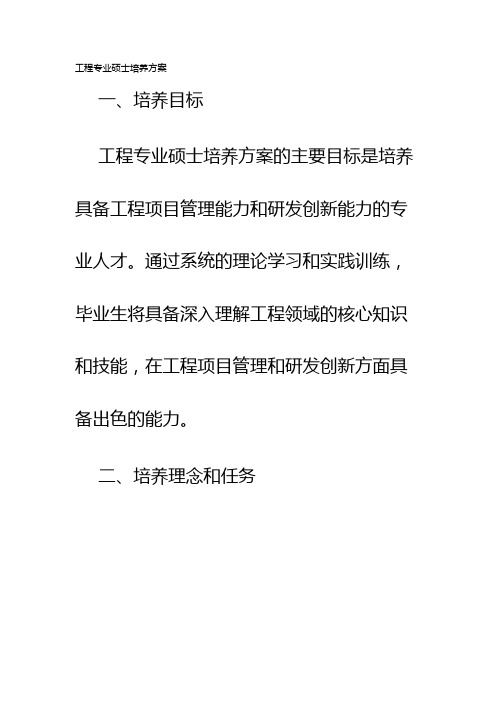
工程专业硕士培养方案一、培养目标工程专业硕士培养方案的主要目标是培养具备工程项目管理能力和研发创新能力的专业人才。
通过系统的理论学习和实践训练,毕业生将具备深入理解工程领域的核心知识和技能,在工程项目管理和研发创新方面具备出色的能力。
二、培养理念和任务工程专业硕士的培养理念是注重实践应用、培养创新人才、强化能力培养。
其培养任务主要包括:1. 培养学生的工程项目管理能力。
通过学习课程和实践项目,使学生具备完善的项目管理理论知识和实践技能,能够独立设计、组织和管理工程项目。
2. 培养学生的研发创新能力。
通过开展科研项目和实践案例分析,培养学生的科学研究能力,提高他们的研发创新能力,使他们能够在工程领域中开展独立的创新研究。
3. 培养学生的团队协作能力和跨学科综合能力。
培养学生具备良好的团队合作精神和跨学科综合能力,能够在多学科背景下进行工程项目管理和创新研究。
三、培养方式和方法工程专业硕士培养方案采用全日制研究生培养方式,主要包括课程学习、实践训练、科研项目和学术交流等环节。
培养方法主要包括:1. 理论学习。
学生需修满一定学分的专业课程,涵盖工程项目管理、研发创新、经济管理等方面的知识,为学生打下扎实的理论基础。
2. 实践训练。
学生将参与工程实践项目,亲身体验实际工程项目的管理和创新过程,提升实践能力和解决问题的能力。
3. 科研项目。
学生将参与科研项目的设计和实施,积累科研经验,进一步提高研发创新能力。
4. 学术交流。
学生将参加学术会议和学术报告,与同行交流学术成果,提高学术素养和专业水平。
四、课程设置1. 工程项目管理:介绍工程项目管理的基本理论和方法,培养学生的项目组织、计划和管理能力。
2. 研发创新:介绍工程研发创新的原则和方法,培养学生的创新思维和创新管理能力。
3. 工程经济管理:介绍工程经济分析和决策的基本理论和方法,培养学生的经济分析和管理能力。
4. 工程实践项目:学生将参与工程实践项目,在实践中提升项目管理和创新能力。
攻读工程硕士专业学位研究生培养方案

特色与创新
行业合作与产学研一体化
1.A 与行业领先企业和研究机构合作,共同制定培 养方案,实现产学研一体化。
国际化培养
1.B 为学生提供国际交流机会,聘请海外专家
授课,以提升学生的国际视野和竞争力。
以行业需求为导向
1.C 紧密结合行业发展趋势和需求,设置前沿、 实用的课程,以培养行业急需人才。
04
具有良好的身心素质和健康生活方式,具有 健康体魄和良好心态。
培养方式与特色
02
培养方式
01
实行学分制
工程硕士专业学位研究生需完成规定的学分,包括课程 学分、实践学分和科研学分。
02
重视实践环节
为确保学生具备实际工作能力,培养方案中包括多个实 践环节,如企业实习、项目实践等。
03
强调综合素质培养
培养具有创新精神、创业能力和社会责任感,适应我国经济建设和社会发展需要的工程技术人才和工 程管理人才。
业务要求
掌握坚实宽广的基础理论和系统深入的专业知识,包括工程领域的核心理论和基本技能,以及相邻学 科的一般原理。
掌握解决工程问题的先进技术方法和现代化技术手段,能够独立完成工程技术或工程管理方面的工作。
开题报告
报告内容应包括研究背景、研究目的、研究内容、研究方法、预期成果等,并需 经过导师和学术委员会的审核与评估。
论文撰写与质量控制
论文结构
论文结构应严谨,包括引言、文献综述、研究方法、实验结 果与分析、结论等部分。
质量控制
论文撰写过程中需遵循学术规范,引用文献需注明出处,不 得抄袭他人成果,同时需接受学术委员会的质量控制和审查 。
04 导师队伍与科研实践
皮革化学与工程
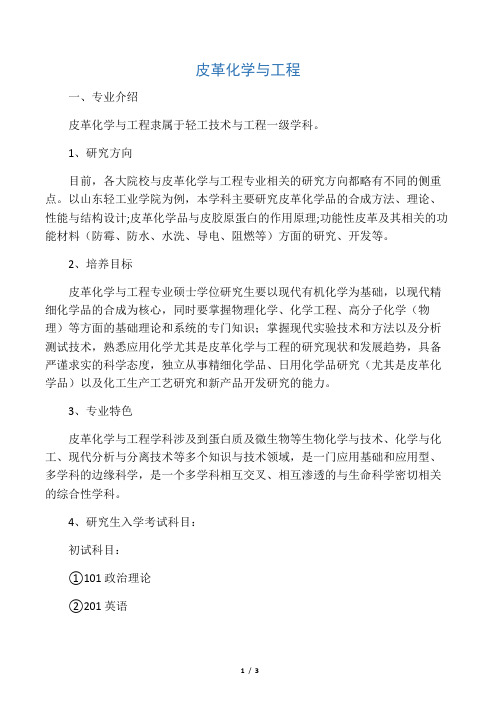
皮革化学与工程一、专业介绍皮革化学与工程隶属于轻工技术与工程一级学科。
1、研究方向目前,各大院校与皮革化学与工程专业相关的研究方向都略有不同的侧重点。
以山东轻工业学院为例,本学科主要研究皮革化学品的合成方法、理论、性能与结构设计;皮革化学品与皮胶原蛋白的作用原理;功能性皮革及其相关的功能材料(防霉、防水、水洗、导电、阻燃等)方面的研究、开发等。
2、培养目标皮革化学与工程专业硕士学位研究生要以现代有机化学为基础,以现代精细化学品的合成为核心,同时要掌握物理化学、化学工程、高分子化学(物理)等方面的基础理论和系统的专门知识;掌握现代实验技术和方法以及分析测试技术,熟悉应用化学尤其是皮革化学与工程的研究现状和发展趋势,具备严谨求实的科学态度,独立从事精细化学品、日用化学品研究(尤其是皮革化学品)以及化工生产工艺研究和新产品开发研究的能力。
3、专业特色皮革化学与工程学科涉及到蛋白质及微生物等生物化学与技术、化学与化工、现代分析与分离技术等多个知识与技术领域,是一门应用基础和应用型、多学科的边缘科学,是一个多学科相互交叉、相互渗透的与生命科学密切相关的综合性学科。
4、研究生入学考试科目:初试科目:①101政治理论②201英语③302数学二④803有机化学(含实验)(注:以华东理工大学为例,各院校在考试科目中有所不同)二、推荐院校皮革化学与工程全国招生较强的单位有四川大学、陕西科技大学、天津科技大学、华东理工大学、山东轻工业学院等。
三、就业前景轻工技术与工程是关系到国民经济与人民生活的重要领域,在新的世纪,它将对我国的社会主义现代化建设、人民生活水平的提高、促进社会和经济的健康与协调发展及中国的繁荣富强起重要作用。
作为本工程领域中的一门重要二级学科,皮革化学与工程专业的就业有其有利的优势,同时也有不太乐观的方面。
因为专业性质的缘故该学科毕业生如果在相关领域内刚起步时条件相对比较艰苦,两三年后将会越来越好,所以毕业生在选择该领域职业时要做好一定的准备,结合自己的兴趣来更好的择业。
轻化工程(造纸)培养方案1
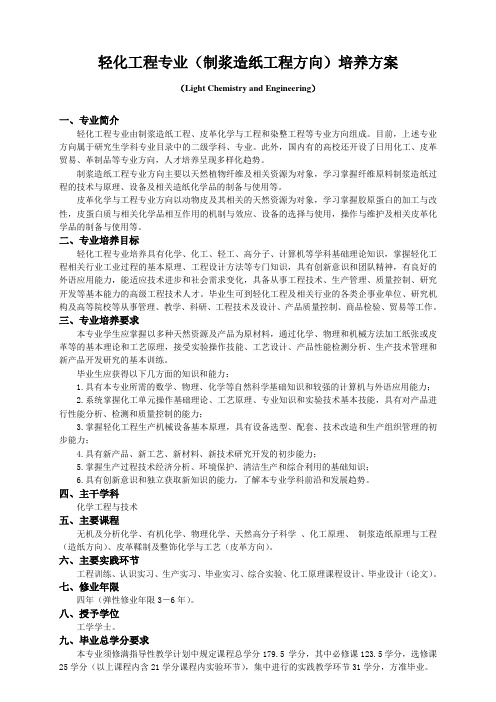
轻化工程专业(制浆造纸工程方向)培养方案(Light Chemistry and Engineering)一、专业简介轻化工程专业由制浆造纸工程、皮革化学与工程和染整工程等专业方向组成。
目前,上述专业方向属于研究生学科专业目录中的二级学科、专业。
此外,国内有的高校还开设了日用化工、皮革贸易、革制品等专业方向,人才培养呈现多样化趋势。
制浆造纸工程专业方向主要以天然植物纤维及相关资源为对象,学习掌握纤维原料制浆造纸过程的技术与原理、设备及相关造纸化学品的制备与使用等。
皮革化学与工程专业方向以动物皮及其相关的天然资源为对象,学习掌握胶原蛋白的加工与改性,皮蛋白质与相关化学品相互作用的机制与效应、设备的选择与使用,操作与维护及相关皮革化学品的制备与使用等。
二、专业培养目标轻化工程专业培养具有化学、化工、轻工、高分子、计算机等学科基础理论知识,掌握轻化工程相关行业工业过程的基本原理、工程设计方法等专门知识,具有创新意识和团队精神,有良好的外语应用能力,能适应技术进步和社会需求变化,具备从事工程技术、生产管理、质量控制、研究开发等基本能力的高级工程技术人才。
毕业生可到轻化工程及相关行业的各类企事业单位、研究机构及高等院校等从事管理、教学、科研、工程技术及设计、产品质量控制、商品检验、贸易等工作。
三、专业培养要求本专业学生应掌握以多种天然资源及产品为原材料,通过化学、物理和机械方法加工纸张或皮革等的基本理论和工艺原理,接受实验操作技能、工艺设计、产品性能检测分析、生产技术管理和新产品开发研究的基本训练。
毕业生应获得以下几方面的知识和能力:1.具有本专业所需的数学、物理、化学等自然科学基础知识和较强的计算机与外语应用能力;2.系统掌握化工单元操作基础理论、工艺原理、专业知识和实验技术基本技能,具有对产品进行性能分析、检测和质量控制的能力;3.掌握轻化工程生产机械设备基本原理,具有设备选型、配套、技术改造和生产组织管理的初步能力;4.具有新产品、新工艺、新材料、新技术研究开发的初步能力;5.掌握生产过程技术经济分析、环境保护、清洁生产和综合利用的基础知识;6.具有创新意识和独立获取新知识的能力,了解本专业学科前沿和发展趋势。
工业工程领域全日制工程硕士研究生培养方案

工业工程领域全日制工程硕士研究生培养方案工业工程领域全日制工程硕士研究生培养方案为满足行业对复合型高层次人才的需求,工业工程领域全日制工程硕士研究生培养方案应运而生。
该方案旨在培养具备较高工程素养和综合能力的工业工程专业人才,以适应市场需求和行业发展的需要。
一、培养方案概述该工程硕士研究生培养方案旨在构建具有德、智、体、美全面发展的高端复合型人才,培养学生具有扎实的工程知识和能力,较强的语言、能力和创新精神。
该方案针对行业人才需求,注重工程与实践能力的培养,同时注重语言、人文素质、国际化视野等方面的培养,使学生具有全球视野和国际化思维。
二、培养目标该工程硕士研究生培养方案旨在培养具备以下能力和素养的人才:1.掌握系统工程的基本理论和实践方法,具有较高的技术水平和创新能力,能够在工程项目的全过程中进行工程分析、设计、规划、实施和管理。
2.具有较强的沟通和表达能力,能够进行有效的跨学科协作和团队管理,并具有一定的谈判能力和影响力。
3.具有较强的语言和人文素质,具有国际视野和跨文化沟通能力。
4.具有职业道德和社会责任感,能够适应不同工作环境和工作要求。
三、培养方案设置1.课程设置该工程硕士研究生培养方案的课程设置包括必修课程和选修课程两部分。
其中必修课程涵盖系统工程、工程管理、工程制造、运筹学、质量管理等方面。
选修课程涵盖工业工程领域的前沿知识和技术,如大数据分析、智能制造、人工智能等。
2.实践环节该工程硕士研究生培养方案的实践环节包括实验实践、工程项目实践和科研实践三个阶段。
实验实践主要是为了提升学生的实验室技能和动手能力;工程项目实践主要是为了让学生在真实的项目环境中,进行工程管理、设计和实施;科研实践主要是为了让学生具备科研能力和创新意识。
实践环节的总学分占整个培养方案的比例不小于50%。
3.学位论文该工程硕士研究生培养方案设有学位论文阶段,要求学生在导师指导下完成一篇符合学术规范和工程实践要求的学位论文。
工程硕士培养方案(3篇)

第1篇一、培养目标工程硕士培养方案旨在培养适应社会主义现代化建设需要,具备扎实理论基础、较强实践能力和创新精神的高层次工程技术人才。
通过本培养方案的学习,使学生能够:1. 掌握所从事工程领域的基本理论、基本知识和基本技能;2. 具备解决复杂工程问题的能力,能够独立开展科学研究和技术创新;3. 具有良好的职业道德和社会责任感,能够适应工程领域的快速发展;4. 具备较强的跨学科、跨领域合作与交流能力。
二、培养对象本培养方案适用于在我国高校、科研院所及企事业单位从事工程技术工作,具有相关工程背景的在职人员。
三、培养模式1. 课程学习:包括公共课、专业课和专业选修课。
2. 实践环节:包括实习、实验、课程设计、毕业设计等。
3. 科研训练:通过参与导师的科研项目,提高学生的科研能力和创新能力。
4. 学术交流:定期举办学术讲座、研讨会等,拓宽学生的学术视野。
四、课程设置(一)公共课1. 政治理论课:包括马克思主义基本原理、毛泽东思想、邓小平理论、三个代表重要思想、科学发展观等。
2. 外语:英语,包括听力、口语、阅读、写作等。
3. 计算机科学与技术:计算机应用基础、高级程序设计、数据库原理与应用等。
(二)专业课1. 专业基础课:根据所学专业方向,选择相应的专业基础课程,如机械工程专业的学生可以选择机械设计、机械制造工艺学等。
2. 专业核心课:根据所学专业方向,选择相应的专业核心课程,如机械工程专业的学生可以选择机械动力学、机械系统设计等。
(三)专业选修课1. 前沿技术课程:介绍国内外工程领域的最新研究成果和发展趋势,如人工智能、大数据、物联网等。
2. 跨学科课程:培养学生跨学科思维和创新能力,如工程经济学、项目管理等。
五、实践环节1. 实习:在导师的指导下,到企事业单位进行实习,了解实际工程问题,提高实践能力。
2. 实验:完成规定的实验课程,掌握实验技能,培养严谨的科学态度。
3. 课程设计:完成专业课程设计,锻炼学生的设计能力和创新能力。
轻工技术与工程领域工程硕士专业学位研究生培养方案
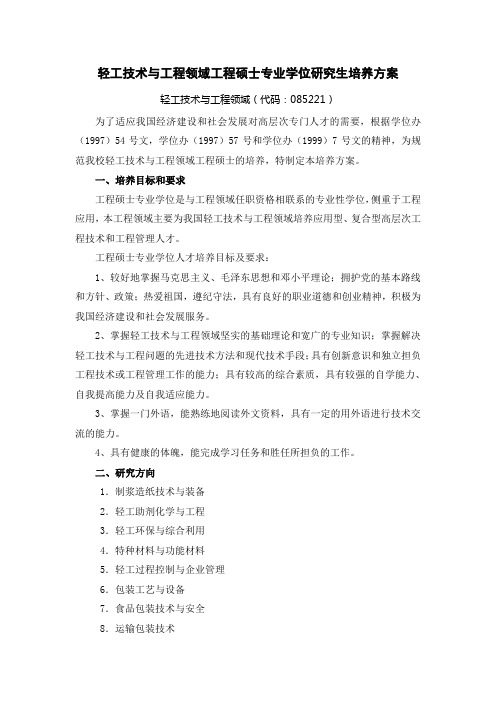
轻工技术与工程领域工程硕士专业学位研究生培养方案轻工技术与工程领域(代码:085221)为了适应我国经济建设和社会发展对高层次专门人才的需要,根据学位办(1997)54号文,学位办(1997)57号和学位办(1999)7号文的精神,为规范我校轻工技术与工程领域工程硕士的培养,特制定本培养方案。
一、培养目标和要求工程硕士专业学位是与工程领域任职资格相联系的专业性学位,侧重于工程应用,本工程领域主要为我国轻工技术与工程领域培养应用型、复合型高层次工程技术和工程管理人才。
工程硕士专业学位人才培养目标及要求:1、较好地掌握马克思主义、毛泽东思想和邓小平理论;拥护党的基本路线和方针、政策;热爱祖国,遵纪守法,具有良好的职业道德和创业精神,积极为我国经济建设和社会发展服务。
2、掌握轻工技术与工程领域坚实的基础理论和宽广的专业知识;掌握解决轻工技术与工程问题的先进技术方法和现代技术手段;具有创新意识和独立担负工程技术或工程管理工作的能力;具有较高的综合素质,具有较强的自学能力、自我提高能力及自我适应能力。
3、掌握一门外语,能熟练地阅读外文资料,具有一定的用外语进行技术交流的能力。
4、具有健康的体魄,能完成学习任务和胜任所担负的工作。
二、研究方向1.制浆造纸技术与装备2.轻工助剂化学与工程3.轻工环保与综合利用4.特种材料与功能材料5.轻工过程控制与企业管理6.包装工艺与设备7.食品包装技术与安全8.运输包装技术9.包装材料与成型技术三、入学要求1、招收对象主要为:取得学士学位后,从事3年或3年以上工程实践工作,经所在单位推荐的优秀在职人员;或虽未获得学士学位但具有本科学历后工作满4年的工程的优秀在职人员。
2、报考人员须参加攻读工程硕士专业学位的入学考试。
考试科目为外语、数学、语言、逻辑(GCT全国联考)和专业综合考试。
专业综合考试的重点是考核考生解决工程实际问题的能力。
四、培养方式及学习年限1、按照国务院学位委员会文件规定,在职攻读工程硕士专业学位的研究生,采取“进校不离岗”的方式。
工业工程培养方案硕士

工业工程培养方案硕士
摘要:
一、工业工程培养方案硕士的背景与意义
二、培养目标与要求
三、课程设置与实践教学
四、就业方向与发展前景
正文:
工业工程培养方案硕士是我国高等教育体系中的一项重要人才培养计划,旨在培养具备扎实的工业工程理论基础和实践能力,能够独立开展科学研究和解决实际工程问题的高级专门人才。
这一培养方案具有很强的实践性和应用性,对于推动我国工业工程领域的科技进步和产业发展具有重要意义。
工业工程培养方案硕士的培养目标主要包括:一是培养具备扎实的工业工程理论基础,掌握现代工业工程技术与方法,能够独立开展科学研究和解决实际工程问题的高级专门人才;二是培养具备良好的团队协作能力、沟通能力和创新意识,能够在多学科团队中承担重要角色,开展跨学科研究的复合型人才;三是培养具备国际视野和跨文化沟通能力,能够在国际竞争与合作中发挥积极作用的人才。
为了实现上述培养目标,工业工程培养方案硕士的课程设置分为公共课程、专业基础课程、专业核心课程和实践教学四个方面。
公共课程主要包括政治理论、外语、数学、计算机等基础课程;专业基础课程主要包括工程力学、材料科学、热力学与传热学等工程基础知识;专业核心课程主要包括工业工程
原理、生产系统设计、运筹学、质量管理、人因工程等工业工程专业课程;实践教学主要包括实验、实习、课程设计、毕业设计等环节,旨在培养学生的实践能力和创新能力。
工业工程培养方案硕士毕业生主要就业方向包括:一是进入各类制造企业、服务业企业、政府部门等从事生产管理、运营管理、质量管理、项目管理等工作;二是进入科研机构、高校等从事科学研究、技术开发和教学工作;三是进入咨询公司、工程设计公司等从事工程咨询、规划、设计等工作。
工业工程硕士培养方案
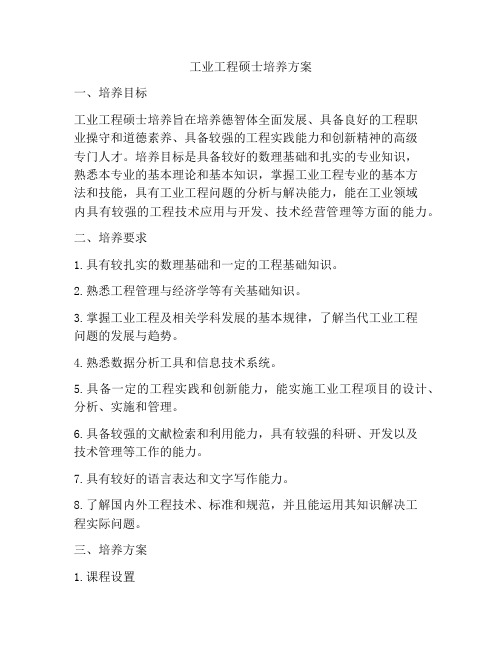
工业工程硕士培养方案一、培养目标工业工程硕士培养旨在培养德智体全面发展、具备良好的工程职业操守和道德素养、具备较强的工程实践能力和创新精神的高级专门人才。
培养目标是具备较好的数理基础和扎实的专业知识,熟悉本专业的基本理论和基本知识,掌握工业工程专业的基本方法和技能,具有工业工程问题的分析与解决能力,能在工业领域内具有较强的工程技术应用与开发、技术经营管理等方面的能力。
二、培养要求1.具有较扎实的数理基础和一定的工程基础知识。
2.熟悉工程管理与经济学等有关基础知识。
3.掌握工业工程及相关学科发展的基本规律,了解当代工业工程问题的发展与趋势。
4.熟悉数据分析工具和信息技术系统。
5.具备一定的工程实践和创新能力,能实施工业工程项目的设计、分析、实施和管理。
6.具备较强的文献检索和利用能力,具有较强的科研、开发以及技术管理等工作的能力。
7.具有较好的语言表达和文字写作能力。
8.了解国内外工程技术、标准和规范,并且能运用其知识解决工程实际问题。
三、培养方案1.课程设置(1)基础课程:高等数学、线性代数、概率论与数理统计、运筹学、工程经济学、工业工程概论等。
(2)专业课程:生产系统工程、工业企业管理、人机工程学、质量管理与可靠性、物流与供应链管理、工业工程系统仿真、信息系统工程等。
(3)选修课程:现代物流技术、项目管理、智能制造系统、供应链管理、企业资源计划等。
2.实践教学(1)实验课程:生产系统工程实验、人机工程学实验、工业工程系统仿真实验等。
(2)实习教学:工业工程实习、生产实习、物流实习等。
3.科研训练(1)毕业设计:结合企业实际需求和自身兴趣,选择一项工业工程项目,进行综合设计和论文撰写。
(2)学术论文:结合实际案例或理论模型,撰写一篇关于工业工程相关课题的学术论文。
四、培养措施1.教学方法(1)采用问题导向和案例分析的教学方法,培养学生对实际工程问题的分析和解决能力。
(2)加强理论与实践相结合的教学,引导学生进行实际案例分析和解决方案设计。
工程专业硕士培养方案(3篇)
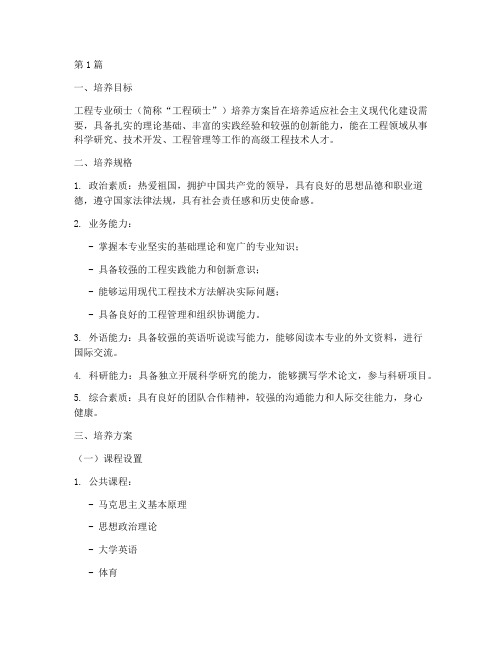
第1篇一、培养目标工程专业硕士(简称“工程硕士”)培养方案旨在培养适应社会主义现代化建设需要,具备扎实的理论基础、丰富的实践经验和较强的创新能力,能在工程领域从事科学研究、技术开发、工程管理等工作的高级工程技术人才。
二、培养规格1. 政治素质:热爱祖国,拥护中国共产党的领导,具有良好的思想品德和职业道德,遵守国家法律法规,具有社会责任感和历史使命感。
2. 业务能力:- 掌握本专业坚实的基础理论和宽广的专业知识;- 具备较强的工程实践能力和创新意识;- 能够运用现代工程技术方法解决实际问题;- 具备良好的工程管理和组织协调能力。
3. 外语能力:具备较强的英语听说读写能力,能够阅读本专业的外文资料,进行国际交流。
4. 科研能力:具备独立开展科学研究的能力,能够撰写学术论文,参与科研项目。
5. 综合素质:具有良好的团队合作精神,较强的沟通能力和人际交往能力,身心健康。
三、培养方案(一)课程设置1. 公共课程:- 马克思主义基本原理- 思想政治理论- 大学英语- 体育2. 专业基础课程:- 工程力学- 材料力学- 热力学- 电路- 计算机基础- 数据结构3. 专业核心课程:- 本专业核心课程,如结构设计、控制理论、信号与系统、通信原理等。
4. 选修课程:- 根据学生兴趣和未来发展方向,选择相关课程,如工程经济学、项目管理、知识产权等。
5. 实践环节:- 课程设计- 毕业论文(设计)- 实习- 企业实践(二)教学环节1. 课堂教学:采用多媒体教学、案例教学、讨论式教学等多种教学方法,提高教学质量。
2. 实践教学:通过课程设计、毕业论文(设计)、实习、企业实践等环节,培养学生的实践能力和创新能力。
3. 科研训练:鼓励学生参与导师的科研项目,提高学生的科研能力。
4. 国际交流:组织学生参加国际学术会议、短期交流项目等,拓宽学生的国际视野。
四、学位授予1. 完成培养方案规定的课程学习,成绩合格;2. 通过学位论文答辩;3. 遵守学校各项规章制度,具有良好的学术道德。
工程专业硕士培养方案

根据培养方向,设置以下专业课程:
(1)建筑工程与管理方向(6学分)
(2)电子信息工程方向(6学分)
(3)机械设计与制造方向(6学分)
(4)能源与环境工程方向(6学分)
3.实践环节:共计8学分。
(1)实践课程(4学分)
(2)实践项目(2学分)
(3)实习(2学分)
4.学位论文:共计10学分。
5.质量保障:建立健全质量保障体系,确保研究生培养质量。
六、毕业与学位授予
1.毕业条件:完成培养方案规定的学分,通过学位论文答辩。
2.学位授予:符合学校学位授予条件,授予工程专业硕士学位。
七、附则
1.本方案适用于全日制工程专业硕士研究生。
2.本方案未尽事宜,按照学校相关规章制度执行。
3.本方案自发布之日起实施,如有修改,以最新版本为准。
工程专业硕士培养方案
第1篇
工程专业硕士培养方案
一、背景
为适应国家经济社会发展需求,培养具有创新能力、实践能力和国际竞争力的工程专业人才,根据《中华人民共和国高等教育法》、《研究生教育管理规定》等相关法律法规,结合我国工程专业硕士教育的实际情况,特制定本培养方案。
二、培养目标
1.掌握马克思主义基本原理,坚持四项基本原则,具有良好的政治素质、道德品质和职业素养。
2.掌握宽广的专业基础知识,具有较强的工程实践能力和创新意识。
3.掌握一定的研究方法,能独立从事工程技术研究或项目管理。
4.具有良好的国际视野,能适应全球化背景下的工程领域竞争与合作。
5.具备较强的组织协调能力、团队协作精神和终身学习能力。
三、培养要求
1.学位要求:完成规定学分,通过学位论文答辩。
全日制轻工技术与工程专业学位研究生双导师培养模式的探索与实践

2019年第20期广东化工第46卷总第406期·159·全日制轻工技术与工程专业学位研究生双导师培养模式的探索与实践陈启杰,胡可信,王萍,张跃飞(长沙理工大学化学与食品工程学院,湖南长沙410114)Exploration and Practice of Double Tutor Training Mode for Full-time Graduate Students Majoring in Light Industry Technology and EngineeringChen Qijie,Hu Kexin,Wang Ping,Zhang Yuefei(School of Chemistry and Food Engineering,Changsha University of Science and Technology,Changsha410114,China)Abstract:Combined with the problems existing in the training process of full-time master of light industry technology and engineering in Changsha University of Science and Technology,To explore the construction of trinity"double-qualified"tutor team,improve the construction of trinity professional master's teaching system in light industry,build the trinity double-qualified master's professional paper evaluation system in light industry,and further improve and standardize the evaluation mechanism of professional master.And put forward some suggestions to improve the process of"double tutor"coordinating innovation training.Keywords:professional degree;double tutor;training mode随着高等教育的不断发展,特别是国家要求创建世界一流学科及一流专业,创新发展的研究生教育是高校“双一流”建设的重要特征,对高等学校内涵发展至关重要,提高专业学位研究生的培养质量和水平是高校争创“双一流”建设的重要组成部分[1-2]。
轻工技术与工程一级学科硕士研究生培养方案
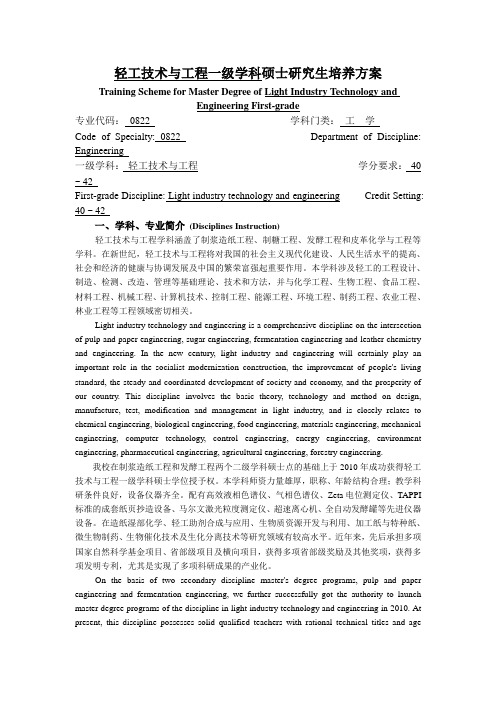
轻工技术与工程一级学科硕士研究生培养方案Training Scheme for Master Degree of Light Industry Technology andEngineering First-grade专业代码:0822 学科门类:工学Code of Specialty: 0822 Department of Discipline: Engineering一级学科:轻工技术与工程学分要求:40 ~ 42First-grade Discipline: Light industry technology and engineering Credit Setting:40 ~ 42一、学科、专业简介(Disciplines Instruction)轻工技术与工程学科涵盖了制浆造纸工程、制糖工程、发酵工程和皮革化学与工程等学科。
在新世纪,轻工技术与工程将对我国的社会主义现代化建设、人民生活水平的提高、社会和经济的健康与协调发展及中国的繁荣富强起重要作用。
本学科涉及轻工的工程设计、制造、检测、改造、管理等基础理论、技术和方法,并与化学工程、生物工程、食品工程、材料工程、机械工程、计算机技术、控制工程、能源工程、环境工程、制药工程、农业工程、林业工程等工程领域密切相关。
Light industry technology and engineering is a comprehensive discipline on the intersection of pulp and paper engineering, sugar engineering, fermentation engineering and leather chemistry and engineering. In the new century, light industry and engineering will certainly play an important role in the socialist modernization construction, the improvement of people's living standard, the steady and coordinated development of society and economy, and the prosperity of our country. This discipline involves the basic theory, technology and method on design, manufacture, test, modification and management in light industry, and is closely relates to chemical engineering, biological engineering, food engineering, materials engineering, mechanical engineering, computer technology, control engineering, energy engineering, environment engineering, pharmaceutical engineering, agricultural engineering, forestry engineering.我校在制浆造纸工程和发酵工程两个二级学科硕士点的基础上于2010年成功获得轻工技术与工程一级学科硕士学位授予权。
一级学科管理科学与工程专业硕士研究生培养方案.doc
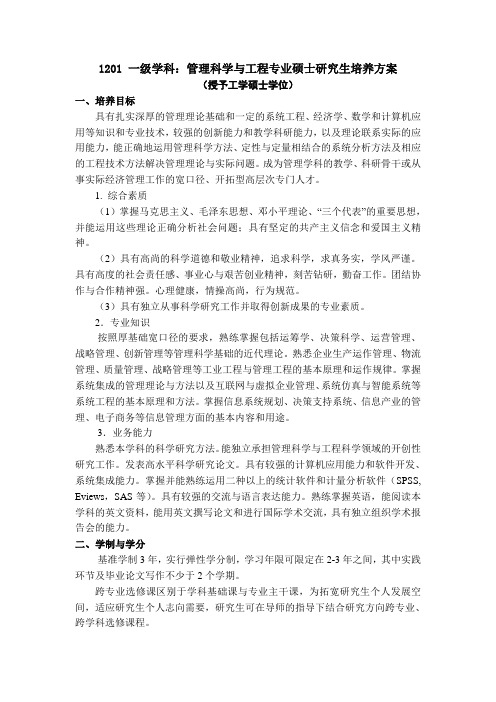
1201 一级学科:管理科学与工程专业硕士研究生培养方案(授予工学硕士学位)一、培养目标具有扎实深厚的管理理论基础和一定的系统工程、经济学、数学和计算机应用等知识和专业技术,较强的创新能力和教学科研能力,以及理论联系实际的应用能力,能正确地运用管理科学方法、定性与定量相结合的系统分析方法及相应的工程技术方法解决管理理论与实际问题。
成为管理学科的教学、科研骨干或从事实际经济管理工作的宽口径、开拓型高层次专门人才。
1. 综合素质(1)掌握马克思主义、毛泽东思想、邓小平理论、“三个代表”的重要思想,并能运用这些理论正确分析社会问题;具有坚定的共产主义信念和爱国主义精神。
(2)具有高尚的科学道德和敬业精神,追求科学,求真务实,学风严谨。
具有高度的社会责任感、事业心与艰苦创业精神,刻苦钻研,勤奋工作。
团结协作与合作精神强。
心理健康,情操高尚,行为规范。
(3)具有独立从事科学研究工作并取得创新成果的专业素质。
2.专业知识按照厚基础宽口径的要求,熟练掌握包括运筹学、决策科学、运营管理、战略管理、创新管理等管理科学基础的近代理论。
熟悉企业生产运作管理、物流管理、质量管理、战略管理等工业工程与管理工程的基本原理和运作规律。
掌握系统集成的管理理论与方法以及互联网与虚拟企业管理、系统仿真与智能系统等系统工程的基本原理和方法。
掌握信息系统规划、决策支持系统、信息产业的管理、电子商务等信息管理方面的基本内容和用途。
3.业务能力熟悉本学科的科学研究方法。
能独立承担管理科学与工程科学领域的开创性研究工作。
发表高水平科学研究论文。
具有较强的计算机应用能力和软件开发、系统集成能力。
掌握并能熟练运用二种以上的统计软件和计量分析软件(SPSS, Eviews,SAS等)。
具有较强的交流与语言表达能力。
熟练掌握英语,能阅读本学科的英文资料,能用英文撰写论文和进行国际学术交流,具有独立组织学术报告会的能力。
二、学制与学分基准学制3年,实行弹性学分制,学习年限可限定在2-3年之间,其中实践环节及毕业论文写作不少于2个学期。
0822一级学科轻工技术与工程082203发酵工程专业硕士研究生培养方案

0822 一级学科:轻工技术与工程082203 发酵工程专业硕士研究生培养方案一、专业介绍发酵工程学科是我国重点发展的高新技术——生物工程的重要组成部分,是生物技术产业化的关键。
发酵工程从形成到现在,经历了漫长的发展阶段,它是在酿酒、制醋等传统发酵技术上发展起来的。
从60年代深层发酵法生产抗生素,发酵工程进入了一个新的发展阶段。
70年代以来,基因工程、细胞工程、酶工程、生化工程等新技术的发展给发酵工程注入了新的活力,使其为解决人类所面临的食品与营养、健康与环境、资源与能源等重大问题开辟了新的途径。
今后,发酵工程必将为我国国民经济的发展作出更大的贡献。
二、培养目标掌握发酵工程、酶工程、基因工程、细胞工程、生化工程等方面的理论基础,了解本学科的现状和发展趋势;具备独立从事科研工作的能力。
较为熟练地掌握一门外国语,能阅读本专业的外文资料。
能熟练地使用计算机。
有严谨求实的科学态度和作风。
能胜任高等院校、科研单位、大型企业等单位的教学、科研或高等技术管理工作。
三、研究方向01、发酵工艺。
02、酶工程。
03、生物大分子。
04、现代酿造工艺。
05、生物活性物质分离与提取。
应用微生物四、学习年限本专业硕士研究生学制为3年,即课程学习时间为1年,学位论文工作时间为2年。
在职硕士研究生学习年限可延长1年,即课程学习时间为2年,学位论文工作时间为2年。
提前或延期毕业的研究生按学校有关规定办理。
五、课程设置课程设置见《发酵工程专业硕士研究生课程设置表》。
六、培养方式与方法培养方式包括全脱产、半脱产、不脱产三种方式,其中包含联合培养和委托培养等多种模式。
培养过程遵循以下原则:1.加强研究生的思想政治工作和道德品质、文明礼貌教育。
2.鼓励研究生参加体育锻炼和公益劳动,促进研究生身心健康和全面发展。
3.导师要从每个研究生的具体情况出发,精心制订每个研究生的培养计划,导师所在单位要为研究生培养创造良好的条件。
4.鼓励聘请外单位具有高级职称的专家、学者担任硕士研究生的兼职导师,对研究生进行合作培养。
硕士研究生培养方案(工学)

西安建筑科技大学研究生培养方案Xi’an University of Architecture & Technology研究生培养方案研究生学院二〇〇八年I土木工程(一级学科)攻读硕士学位研究生培养方案学科代码:0814一、适用二级学科及专业●岩土工程(081401)●结构工程(081402)●防震减灾工程及防护工程(081405)●桥梁与隧道工程(081406)●现代结构理论(081420)●土木工程建造与管理(081421)●智能建筑环境技术(081422)二、培养目标1、热爱祖国,拥护中国共产党的领导,遵纪守法,品德高尚,诚实守信,勇于创新,做到能力、知识和人格三位一体,积极为社会主义现代化建设事业服务。
2、掌握本学科领域内扎实的基础理论和所研究方向系统的专门知识,熟练掌握一门外国语,熟练阅读和翻译专业资料文献资料,能初步进行外文写作;具有良好的计算机应用能力。
3、具有实事求是的科学态度和端正严谨的学风,理论联系实际,善于钻研,追求创新。
对本学科的现状和发展趋势有基本的了解,具有从事科学研究、教学工作或独立承担专门技术工作的能力。
三、研究方向1、钢结构及其抗震2、混凝土结构及其抗震3、组合结构、混合结构及其抗震4、工程结构耐久性及可靠性5、高层建筑结构及其抗震6、新型结构体系7、工程结构健康检测与智能控制8、工程结构隔振减震及控制9、古文化遗址保护及抗震10、土-基础-结构相互作用11、黄土地基与基础工程12、特殊土与环境岩土工程13、桥梁工程及其抗风和抗震14、路基路面工程15、隧道与地下工程116、土木工程建造控制技术17、项目管理和技术经济18、土木工程信息化技术19、城市建设防灾减灾体系四、学习年限硕士生的学习年限为2-3年。
其中课程学习为1学年,学位论文工作时间不少于1学年,其他时间可进行社会实践或专业生产实践。
硕士生应在规定的期间内完成培养计划要求的课程学习和学位论文工作,对部分提前完成培养计划(在校注册时间不少于1.5年)、学位论文符合申请答辩的研究生,经规定的审批程序可以提前答辩、毕业并申请学位。
- 1、下载文档前请自行甄别文档内容的完整性,平台不提供额外的编辑、内容补充、找答案等附加服务。
- 2、"仅部分预览"的文档,不可在线预览部分如存在完整性等问题,可反馈申请退款(可完整预览的文档不适用该条件!)。
- 3、如文档侵犯您的权益,请联系客服反馈,我们会尽快为您处理(人工客服工作时间:9:00-18:30)。
轻工技术与工程一级学科硕士研究生培养方案Training Scheme for Master Degree of Light Industry Technology andEngineering First-grade专业代码:0822 学科门类:工学Code of Specialty: 0822 Department of Discipline: Engineering一级学科:轻工技术与工程学分要求:40 ~ 42First-grade Discipline: Light industry technology and engineering Credit Setting:40 ~ 42一、学科、专业简介(Disciplines Instruction)轻工技术与工程学科涵盖了制浆造纸工程、制糖工程、发酵工程和皮革化学与工程等学科。
在新世纪,轻工技术与工程将对我国的社会主义现代化建设、人民生活水平的提高、社会和经济的健康与协调发展及中国的繁荣富强起重要作用。
本学科涉及轻工的工程设计、制造、检测、改造、管理等基础理论、技术和方法,并与化学工程、生物工程、食品工程、材料工程、机械工程、计算机技术、控制工程、能源工程、环境工程、制药工程、农业工程、林业工程等工程领域密切相关。
Light industry technology and engineering is a comprehensive discipline on the intersection of pulp and paper engineering, sugar engineering, fermentation engineering and leather chemistry and engineering. In the new century, light industry and engineering will certainly play an important role in the socialist modernization construction, the improvement of people's living standard, the steady and coordinated development of society and economy, and the prosperity of our country. This discipline involves the basic theory, technology and method on design, manufacture, test, modification and management in light industry, and is closely relates to chemical engineering, biological engineering, food engineering, materials engineering, mechanical engineering, computer technology, control engineering, energy engineering, environment engineering, pharmaceutical engineering, agricultural engineering, forestry engineering.我校在制浆造纸工程和发酵工程两个二级学科硕士点的基础上于2010年成功获得轻工技术与工程一级学科硕士学位授予权。
本学科师资力量雄厚,职称、年龄结构合理;教学科研条件良好,设备仪器齐全。
配有高效液相色谱仪、气相色谱仪、Zeta电位测定仪、TAPPI 标准的成套纸页抄造设备、马尔文激光粒度测定仪、超速离心机、全自动发酵罐等先进仪器设备。
在造纸湿部化学、轻工助剂合成与应用、生物质资源开发与利用、加工纸与特种纸、微生物制药、生物催化技术及生化分离技术等研究领域有较高水平。
近年来,先后承担多项国家自然科学基金项目、省部级项目及横向项目,获得多项省部级奖励及其他奖项,获得多项发明专利,尤其是实现了多项科研成果的产业化。
On the basis of two secondary discipline master's degree programs, pulp and paper engineering and fermentation engineering, we further successfully got the authority to launch master degree programs of the discipline in light industry technology and engineering in 2010. At present, this discipline possesses solid qualified teachers with rational technical titles and agestructure, and is provided with good conditions for both teaching and research. Many modern instruments and equipments, such as High performance liquid chromatograph (HLPC), gas chromatograph (GC), Zeta-potential determinator, a set of paper making equipments based on TAPPI standard, Malvern laser particle analyzer, ultracentrifuge, full-automatic fermentation tank, are equipped in the above laboratories. The research achievements and results on papermaking wet-end chemistry, synthesis and application of additives in light chemical engineering, exploitation and utilization of biomass resources, converted paper and specialty paper, microbial pharmaceutical, biological catalytic technology and biochemical separation technique, etc, are all at a higher level. In recent years, dozens of research projects from natural science foundation of China, province and ministry, and enterprises have been assumed/accomplished, awards from province and ministry and other research awards have been granted, scores of research results have been successfully transformed into productivity. Not only inventive patents have been authorized, but also academic monograph, academic papers with higher research level have been issued in China and abroad.二、培养目标(Objectives of Training)本学科培养具有扎实的轻工技术与工程基础理论和宽广的专业知识,了解本学科最新科研发展动向,具备熟练的专业实验技能,具有独立从事轻工技术与工程领域的科学研究和新产品开发的能力以及专业外语阅读和口语能力,能在轻工技术与工程领域从事设计开发、科学研究、教学和管理等工作的高层次人才。
This discipline aims to train senior research talents with rich elementary theory and broad knowledge of light industry technology and engineering, who will be engaged in research and development in this technology and engineering field. The master students of this discipline should grasp the basic theory and specialty knowledge of light industry technology and engineering, get wise to the latest scientific development trend of relevant majors, possess good special experimental skills, be capable of being independently engaged in scientific research and developing new products in light industry technology and engineering, be able to read and talk about the related majors with foreign languages, and be able to engage in the design development,scientific research, education, and management in modern chemical and related industries..三、学制及学习年限(Educational System and Length of Schooling)硕士研究生学制为2~3年,可根据实际情况允许研究生提前或延期毕业,一般不超过4年。
